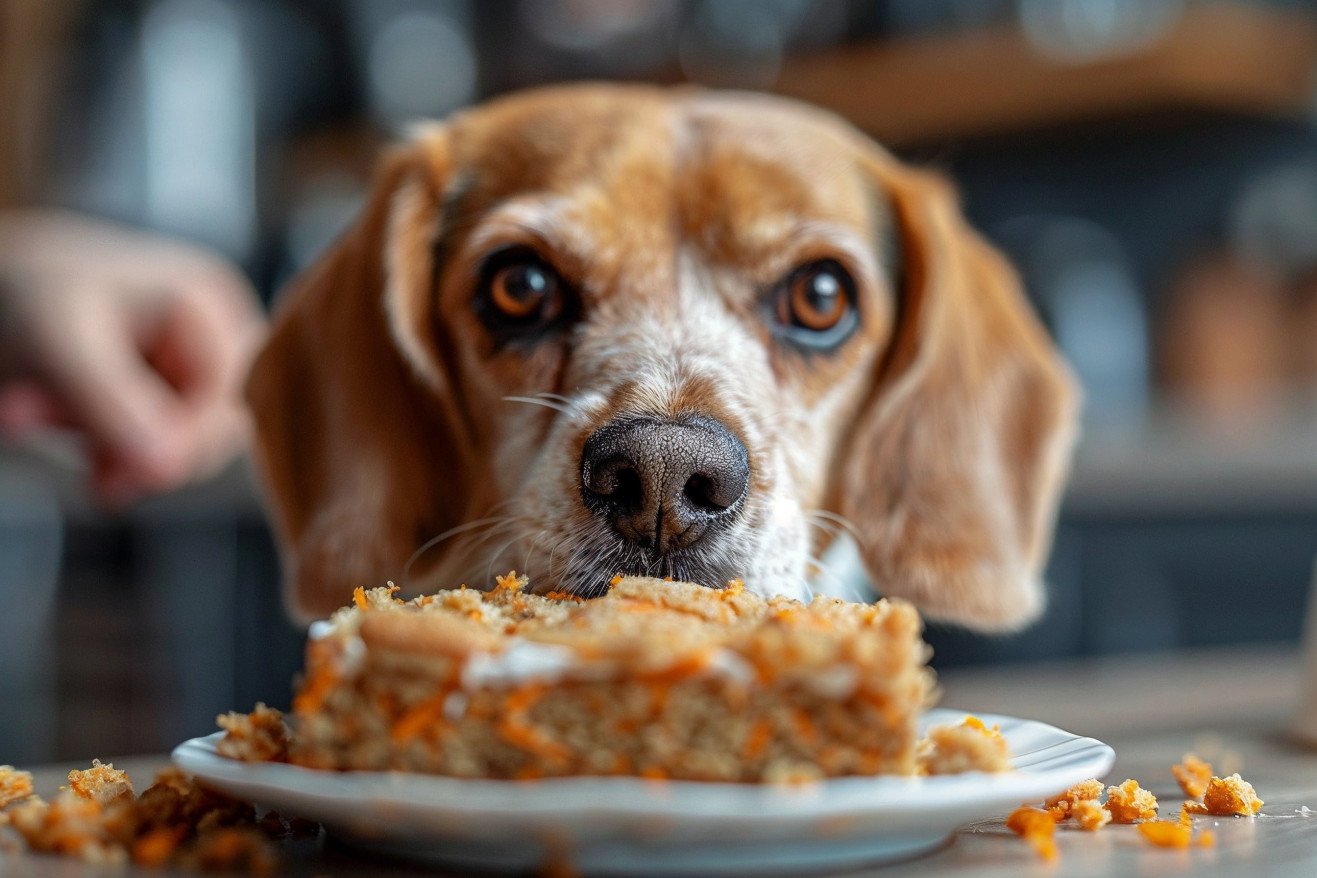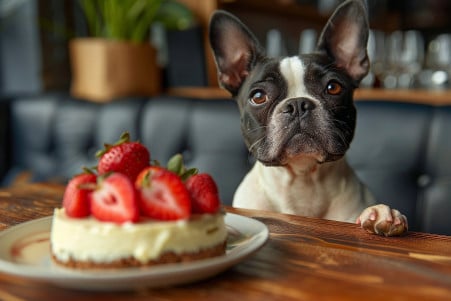Can Dogs Eat Carrot Cake? Potential Risks Explained
14 April 2024 • Updated 13 April 2024

Although carrot cake may seem like a healthy option for your dog because of its main ingredient, the sugar content and other risks make it a less than ideal choice. Carrot cake contains several ingredients that are toxic to dogs, including raisins, nutmeg, and macadamia nuts. The high sugar and fat content can also cause pancreatitis and obesity if consumed in large quantities. In general, human baked goods are not good for dogs because their nutritional needs are so different.
To help you better understand, we'll explore the findings of veterinary nutritionists, toxicologists, and other animal care professionals to explain the risks of feeding carrot cake and other desserts to dogs in more detail. By taking a deep dive into the cake's ingredients and how a dog's body reacts to them, you'll learn more about what you should and shouldn't feed your dog. This way, you can ensure you're always putting your dog's health and safety first.
Can dogs eat carrot cake?
The Risks of Raisins and Grapes for Dogs
Raisins and grapes are known to be highly toxic to dogs and can cause sudden kidney failure, even in small amounts. According to the Merck Veterinary Manual, the consumption of grapes or raisins has been linked to the development of anuric renal failure in some dogs, and there have been reports of similar cases in other animals, including cats and ferrets. The toxic mechanism is not well understood, but clinical signs of toxicity, which can occur 6-12 hours after ingestion, include vomiting, diarrhea, lethargy, abdominal pain, dehydration, and changes in urination.
Although a dose-response relationship has not been clearly established, a study referenced by the AKC reports that as few as 4-5 grapes have been associated with the death of an 18-pound dog. Research published in PMC shows the lowest recorded toxic dose is 19.6 g/kg body weight for grapes and an even lower 2.8 g/kg for raisins. Given these low toxic doses, it's important to seek immediate veterinary care if your dog eats raisins or grapes, which may include decontamination via vomiting induction or activated charcoal, aggressive IV fluid therapy for at least 48 hours, and possibly dialysis for anuric patients, although the overall prognosis is poor.
Other Carrot Cake Ingredients That Are Bad for Dogs
Aside from raisins, carrot cake is often made with other ingredients that are dangerous or toxic to dogs. According to Dog Friendly Carrot Cake - Sprinkles & Sea Salt, some of the most popular ingredients in carrot cake, including nutmeg, macadamia nuts, and cream cheese frosting, can be very harmful to dogs.
Nutmmeg can cause seizures, tremors, and central nervous system problems in dogs if they ingest a large amount. The Dog Bakery says that while macadamia nuts aren't technically toxic, they can cause vomiting, weakness, and hyperthermia (high body temperature) in dogs.
Moreover, Spoiled Hounds says that while cream cheese frosting isn't toxic, it's high in fat and sugar, which can cause digestive upset, pancreatitis, and obesity in dogs. The same goes for low-fat cheeses and other dairy products.
How to Make Carrot Cake for Dogs
While traditional carrot cake is not safe for dogs, there are ways to make dog-friendly versions with healthy, dog-safe ingredients. Kathleen's Cravings offers a recipe for "pupcakes" that calls for whole wheat flour, baking powder, canned pumpkin puree, and xylitol-free peanut butter. Dogster also has a recipe that calls for oat bran, peanut butter, shredded carrots, plain yogurt, and honey.
Both of these recipes avoid baking with any of the toxic ingredients found in traditional carrot cake, including raisins, nuts, and cream cheese frosting. As RecipeTin Eats explains, the recipe should include whole wheat flour, eggs, peanut butter, oil, milk, honey, and shredded carrots. It's important to make sure to use recipes that are specifically formulated for dogs and to check with a vet to make sure that the ingredients are safe for any dietary restrictions or allergies.
Portion Control and How to Feed Your Dog Carrot Cake
Even if you use dog-friendly ingredients, carrot cake dog treats should be fed to dogs in moderation because of their high sugar and calorie content. Per Pet Friendly Humans, veterinarians recommend that treats make up no more than 10% of a dog's daily caloric intake to avoid obesity and other health problems.
Portion control for carrot cake treats will depend on the dog's age, size, and activity level, so it's best to ask a vet. The Dog Forum warns against a dog eating even one slice of carrot cake, saying that it can lead to pancreatitis, digestive upset, and other health issues. As Pawlicy Advisor points out, a medium-sized dog can eat 2-3 baby carrots a day, but the same rules apply to carrot cake - it should be no more than 10% of your dog's daily caloric intake.
Conclusion: Make Your Dog's Health a Priority
While carrot cake may seem like a healthy option for your dog because of the carrots, it actually contains several ingredients that are toxic to dogs and can be harmful to their health. In addition to the potential for raisins, nutmeg, and macadamia nuts to be included in the cake, the high sugar and fat content can cause pancreatitis and obesity.
As noted by Spoiled Hounds, the raisins, nutmeg, and macadamia nuts that are often found in carrot cake are all toxic to dogs and can cause a range of issues from vomiting and diarrhea to kidney failure and seizures. The cream cheese frosting, while not toxic, is high in fat and sugar, which can be harmful to dogs.
While it may be tempting to let your dog have a little taste of your carrot cake, it's best to avoid giving it to them. Instead, you can make a dog-friendly version of carrot cake that uses safe, healthy ingredients like whole wheat flour, eggs, peanut butter, and shredded carrots. Murmurs of Ricotta offers a simple recipe for a dog-friendly carrot cake that your dog is sure to enjoy.
When it comes to portion sizes, it's important to be cautious and limit the amount of treats you give your dog to no more than 10% of their daily caloric intake, as suggested by veterinarians. Eating too many treats can lead to digestive issues, pancreatitis, and other health concerns.
In the end, it's important to make sure that you're putting your dog's health and well-being first. While carrot cake may be a tasty treat for humans, it's not worth the risk when it comes to our furry friends.


